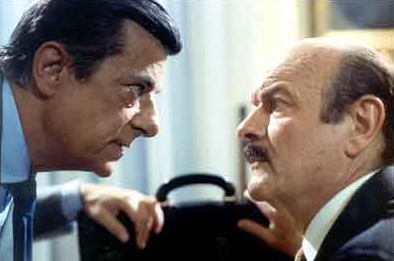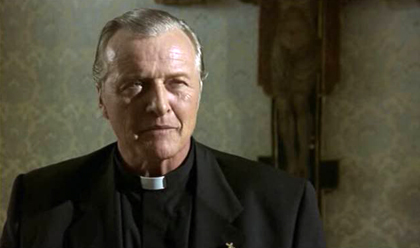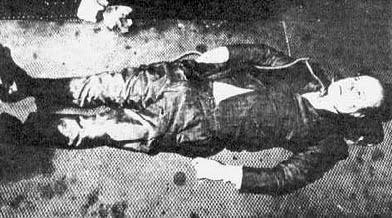
 |
|
|
|
Conspiracy films fall into three categories -- fictional dramas, paranoid exposés that 'speculate creatively' with the truth, and conspiracy pictures based on established facts. Giant conspiracies among businesses, power brokers and bankers seem to be happening every day -- how often do we read that an investigation into a major financial scandal has ended with the jailing of a few mid-level functionaries? Why does nobody pursue the millions (or billions) stolen or missing? Financial scandals come and go, with accusations and indictments flying fast, usually with bad outcomes for the investors cheated and sometimes with an entire country destabilized. Giuseppe Ferrara's 2002 thriller The Bankers of God: The Calvi Affair (I banchieri di Dio) is based on official records about a massive scandal in Italy in 1982. Although most scenes involve tense meetings, shadowy schemes and nervous waiting, the show is paced faster than the typical Kung-Fu film. Writers Armenai Badlucci and Giuseppe Ferrara blast through the facts so quickly that one may need to freeze frame on the English subtitles to keep everything straight. It's a real treat for lovers of complex historical events, with more (real-life) characters than The Godfather. 
Financial police in Italy seize the records of Banker Roberto Calvi (Omero Antonutti), President of the Banco Ambrosiano. Thrown in jail, he at first refuses to cooperate, convinced he can clear his name with help from various high-placed friends. The 'Calvi' affair threatens damage to the full spectrum of vested interests manipulating money and power behind the scenes. His bank directly or indirectly aids in the laundering and distribution of money for the Vatican, the mafia, and the CIA; it is connected to the Opus Dei, a power center in the Catholic Church, as well as the shady Masonic Lodge Propaganda Due (P2) and through them the criminal organization La Banda Magliani. Ambrosiano controls a web of South American banks that service right-wing governments. The Pope uses Calvi's bank to shift huge sums to help anti-communist causes, such as Poland's Solidarity and Nicaraguan Contras; at one point we see Pentagon stamps on a Calvi document. A lot of bank money goes for political bribes, as Calvi works with organizations already at war with each other. When some of the bank's secrets come out, everyone associated with Calvi proposes ways to suspend the damage by sacrificing political enemies. Roberto Calvi just wants out of jail, and the Vatican representatives become angry when his wife Carla (Pamela Villoresi) rushes from one group to another, trying to find someone to help him. Calvi deals with an agent of the Italian Intelligence Service, and tries to work with Cardinale Marcinkus (Rutger Hauer), who handles the Pope's money deals and has inadvertently gone on record as knowing about Ambrosiano's Panamanian branch. The glad-handing fellow banker Flavio Carboni (Giancarlo Giannini) steps in to help as well, and Calvi soon hopes to land on his feet. "Everything blows over in Italy", he's advised. But too many important people are at risk ... and in the end there's only one solution that satisfies (almost) all of the parties affected. The Bankers of God is dedicated to leftist actor Gian Maria Volonté, who was involved with an earlier attempt to film the Calvi story. The machinations of these "gods" of finance link politicians and gangsters, the Pope and espionage agents. A mafia banker goes to jail in the beginning of the film, but the leakage is controlled. When a banker is kidnapped by the Red Brigades, Calvi money flows to Camorra contacts to secure his release. Only when Calvi's records and the identities of his high-level cronies (some given secret names like Cat and Hunchback) come to light does all hell break loose. If Calvi loses his bank presidency and can no longer orchestrate payoffs, everything will fall apart (or in corporate-ese, be 'reorganized'). Frankly, the callous way Calvi is treated by his lifelong associates and high-level church officials, he's better off trusting his mafia contacts. Dozens of 'friendly' meetings take place between these schemers, each looking for a way to escape rich and let the other guy take the fall. The Borgias couldn't have been this ruthless. 
The secret Masonic lodge that convenes to decide Roberto Calvi's fate, their ceremony looks like a cross between the dreaded Knights Templar and the Klu Klux Klan. More than a few of Calvi's clients endorse outright murder as a matter of business. At one point we see Calvi's family react in horror to news film the wounding of the Pope while riding amid a huge crowd. That event seems unrelated to the bankers' schemes, as does TV coverage of Argentina fighting a war with England over some half-frozen islands in the South Atlantic. Calvi does plenty of shady business with Argentina. He can't understand what the fighting is about -- there's no profit to be gained, not even any oil. All of this happens among some of the wealthiest men in the world, who live in mansions, fly in Lear Jets and do frequent business in the halls of the Vatican. They also keep stashes of documents for 'future use'. To secure her husband's release from jail, Signora Calvi threatens to go public with documents that incriminate high Vatican officials. It's a very risky thing to do, as Cardinal Marcinkus can fabricate any document he might need to neutralize criminal wrongdoing -- with the Pope's blessing. It's also implied that the corruption has roots with the Fascist past. Roberto Calvi brags about his exploits when commanding an Italian brigade fighting with the Nazis, and his bank makes huge profits doing illegal arms and drugs deals for entities bolstering right-wing dictatorships. But Calvi's business bedfellows (criminal, government & religious) don't like being in the news. When threatened with blackmail, they aren't above using violence. Director Ferrara has wisely cast The Bankers of God with distinctive-looking actors, an absolute necessity to tell the various players apart. The acting is excellent, with Omero Antonutti making the middle-aged and balding Calvi an interesting leading character. He looks like a coward but knows how to dominate a boardroom. Calvi's supportive wife (Pamela) Villoresi) can hatch a scheme as efficiently as Lady Macbeth. Rutger Hauer is excellent as the conniving Cardinal, who makes Calvi tag along behind him on a golf course, and identifies the gorgeous, silent women that accompany him, as his 'nieces'. It's good to see Hauer in such an important role, after decades of playing in weak exploitation pictures. 
Giancarlo Giannini is a standout as well. His character Flavio Carboni would appear to be the worst schemer of all, playing the helpful pal while coordinating the actions of various mafia killers. He plays the life-and-death game without batting an eye. We're told that Carboni is (as of 2002) under indictment, but still hasn't been brought to trial. The film moves very fast and communicates a lot of factual exposition quite well. For viewers reading subtitles, watching the movie is like a steeplechase. Director Ferrara helps us follow the scheming by occasionally flash-cutting from a conversation to a B&W image of the person being talked about. The incredible, true tangle of criminal personalities, plot and counter-plots plays better than most fictional mysteries, and it ends with a real-life cliffhanger. Perhaps the most shocking thing about The Bankers of God is that a filmmaker could air all of this dirty laundry and not suffer the same kinds of reprisals Calvi did. Perhaps some individuals have died but others are still alive and the case is not closed. How true is the movie? Apparently everything shown came from investigation and trial transcripts. We see a Mafia hit man shoot and wound an Ambrosiano executive on the street, just to send a lesson. The criminal Banda Magliani pulls off a daring murder right in the middle of London. Only near the finish do subtitles intrude, to state that a couple of minor events are based on guesswork. Another large title early on tells us that the Pope's face will not be shown, out of respect. Yet the movie asserts that His Holiness is personally involved in criminal financial schemes. The Rarovideo / Kino Blu-ray of The Bankers of God: The Calvi Affair is a beautiful HD transfer of a movie in fine condition. The widescreen image switches to 1:33 whenever a news video clip from the Italian network R.A.I. is shown. The audio is excellent, with Pino Donaggio's music score adding considerably to the tension. 
A documentary featurette The Blackfriars Connection sketches out the real-life Calvi Affair in a different format, and might be helpful for viewers unable to connect the dots from viewing the main feature. A 12-page essay in Rarovideo's insert pamphlet tells the story of Giuseppe Ferrara's efforts to make this film, a crusade that began back in the late 1980s. The disc case lists the film's running time as 67 minutes, but it actually runs a full two hours and five minutes.
On a scale of Excellent, Good, Fair, and Poor,

Reviews on the Savant main site have additional credits information and are often updated and annotated with reader input and graphics. T'was Ever Thus.
Review Staff | About DVD Talk | Newsletter Subscribe | Join DVD Talk Forum |
| ||||||||||||||||||